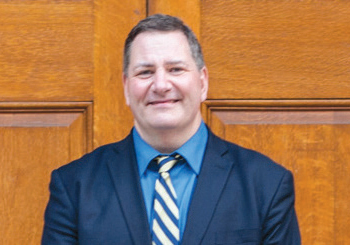
Rising Star
Matthew J. Kidd, Esq. ’89, whose Boston law firm handles personal injury, employment, and bankruptcy matters, has been recognized for his expertise by a number of publications, including the American Bar Association Journal and Fast Company magazine. In addition, Super Lawyers magazine nominated him as a Rising Star.
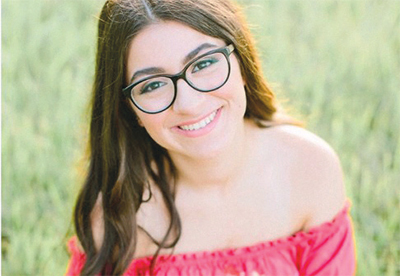
Baubles, Bangles, and Beads
Lucy Figueroa ’22 joined the Boston Women’s Market to grow her business, Beads by Lucy. BU News Service featured the first marketplace for her jewelry and bags in Jamaica Plain. “If Boston Women’s Market didn’t exist, I don’t know where I would be selling because I have no idea how to do any of this,” Figueroa said in the article.
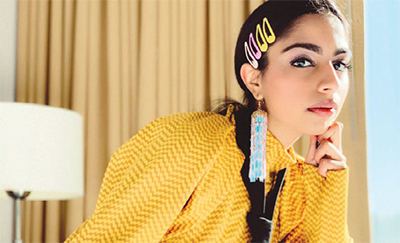
Inspirational Style
Thrive Global spoke with Malvika Sheth ’19 about her career journey, including her fashion blog. “I hope to empower other driven women to embrace fashion as a creative outlet, so that they get up, dress up, and feel confident enough to achieve even their wildest dreams,” she told the lifestyle website.
]]>At Attitudes Dance and Fitness in Billerica, Massachusetts, Associate Professor of Entrepreneurship Brad George, who is the co-owner and chief financial officer, considers himself “a behind-the-scenes jack of all trades.” While co-owner and artistic director Dawn George oversees ballet, jazz, contemporary dance, hip hop, and tap classes for children along with dance and fitness classes for adults, Professor George handles business and marketing strategy along with accounting responsibilities. By bringing his experiences back to the classroom, he hopes to impart knowledge about all aspects of owning a business.
“Students think about the big, glamorous businesses; most startups are not big or glamorous,” Brad George says. “Even with a relatively small business, you deal with a lot of the same issues, things you don’t necessarily read about.” For example, he says the pressure of finding new space after their building was sold almost led the Georges to close their business.
In owning the dance studio, Brad and Dawn George have put their business first and have dealt with making sacrifices, which is a key lesson he has conveyed to his students.
“Most businesses require you to put most of your time and money and everything else into them,” Brad George says. “You don’t want to get in there and realize: ‘This is not at all what I thought it was going to be.’”
He also asks his students to determine what they hope to get out of their ventures. For Brad and Dawn George, their focus is on serving the community. “We have a very different set of goals for our business than other people might,” Brad George says. “I’m a big believer that entrepreneurship isn’t about making the most money; it’s about having a life you want to live.”
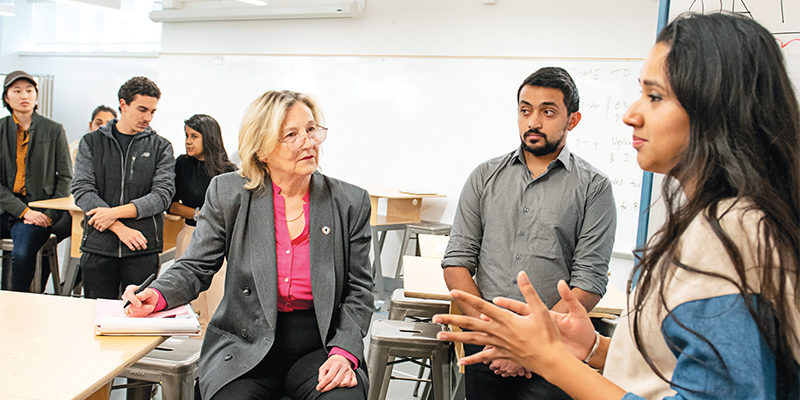
Senior Lecturer Caroline Daniels teaching in the Design Zone at Babson College.
Photo: Webb Chappell
Lessons from Overcoming Challenges
For more than 20 years, entrepreneurship senior lecturer Caroline Daniels managed Daniels Island Properties in Nantucket, a company that built and purchased properties on the island and rented them out to vacationers during the summer months.
On most summer days, Daniels would be in constant contact with architects, building contractors, and real estate professionals responsible for marketing her properties. At the end of each summer, Daniels would close up shop for the winter.
“In any business, you run experiments,” says Daniels, who also has started other ventures, most notably in strategy consulting. “You have to find a really good niche to operate in, and you need to have great customer supplier and other stakeholder relationships.”
When she returned to Babson each fall, Daniels would share stories of how she overcame adversity in her business. Her most frequent tale, she says, involved an early morning delivery of incorrect parts for a home soon to be constructed. She has told her students how she solved the problem by involving everyone as a team to find a solution.
The experience of overcoming a challenge can serve as an inspiration and a how-to for students, Daniels says. “The joy for me in combining both practical, entrepreneurial experience and academic teaching is that I get to share everything I’ve learned with students and give them a pathway. I feel that reduces the risk for them.”
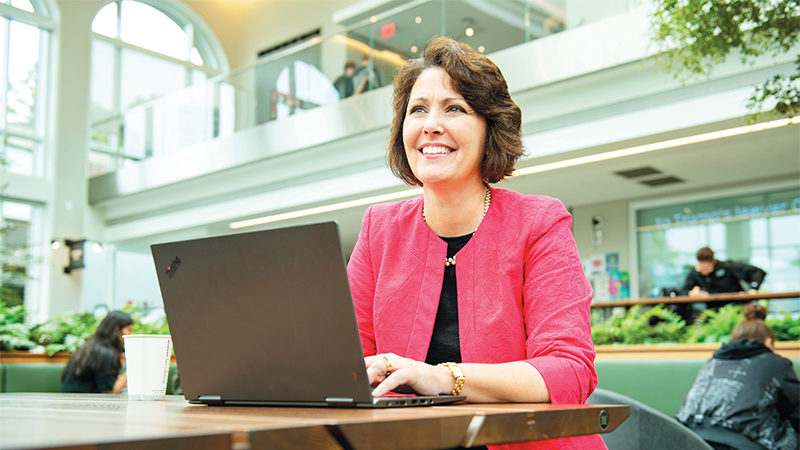
Sandra Bravo MBA’87 working on her consulting business, Bravo Communications.
Photo: Webb Chappell
Getting the Students Involved
For the past 25 years, marketing lecturer Sandra Bravo MBA’87 has helped small businesses grow through her consulting business, Bravo Communications.
“I understand the entrepreneurial mindset,” she says. “It’s fun to have a front-row seat to see what these people accomplish.”
At the same time, Bravo has done volunteer work and occasionally has merged her professional and pro-bono lives. Most recently, she has worked with Friends of Children Inc., a Western Massachusetts organization that helps foster children receive supplies and money for things they need, in addition to easing the transition out of foster care once they turn 18.
Bravo has involved her past students by having them help Friends of Children build its social media presence. Students also have been tasked with creating content calendars and generating marketing ideas.
“It’s hard to explain how important this work is, and how much my Babson students stepped up to the plate,” she says. “We have students who are smart and compassionate, and they know they have the ability to have a voice. It’s so energizing and gives me so much hope for the future. Once the students get invested in something, they know they have the resources to fix it. That equation can add up to amazing things that can be done for the world.”
]]>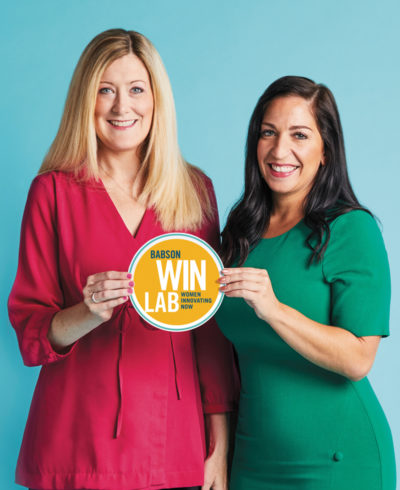
Kara Miller and Michelle Abbs
Photo: Pat Piasecki
Kara Miller
Why is WIN so important?
WIN creates a pipeline of high-growth women entrepreneurs by providing resources that will allow them to grow faster. Currently, less than 3 percent of venture capital dollars go to women entrepreneurs, and when we launched the program, women held only 13 percent of the seats in top accelerator programs. The WIN Lab in Boston is made up of Babson undergrads, graduate students, and alumnae. About one-third of the cohort are women from the broader entrepreneurial ecosystem in Boston.
What are you looking for in these companies?
We’re looking for women entrepreneurs who are thinking big and want to grow large, scalable ventures. One example is Mighty Well, a team of three Babson alumni who started the company in their dorm room when they were undergraduates. Mighty Well creates PICC (peripherally inserted central catheter) covers and other devices for people undergoing medical treatment. Co-founders Emily Levy ’16 and Maria del Mar Gomez ’16 won the Draper Competition, an undergraduate competition for women entrepreneurs, in 2016. Quite a few women have raised funds—more than $13 million between the Boston and Miami labs—and have appeared on shows like “Shark Tank.”
Why do you love this job? Why is it a good fit for you?
I love working with entrepreneurs who are passionate, innovative, and dedicated to what they do. And I find it so incredibly inspiring and rewarding to be part of their entrepreneurial journey and help them identify the resources they need to scale and grow and reach their dreams. From the start of the program, we work with all the “WINners” to identify the goals they’re looking to reach by the end of the program. We help them achieve those goals through the WIN curriculum, network, and coaches who provide expertise. Watching people’s visions come to life is amazing. My job gives me the opportunity to be part of that journey as the entrepreneurs tackle challenges, overcome obstacles, continue to meet milestones, and make strides along the way.
Michelle Abbs
Why is there a WIN Lab in Miami?
The WIN Lab started here four years ago. We were the first Babson presence in Miami programmatically and came because Miami is the College’s fourth-largest alumni area in the world. Some members in our first cohort were Babson alumnae, but the majority of the participants were community members, so WIN was their first exposure to Babson. I think it’s a very unique program offering, different from the ecosystems in Boston or San Francisco where our names might be more well-known.
What makes this job so interesting for you, and what would you like people to know about what you do?
People ask why we need a program for women entrepreneurs. Here’s the reality: Women face unique challenges in entrepreneurship that men will never experience, period. Whether it’s gaining access to capital, managing expansion while underfunded, or being left out of networks, these hurdles are very real, and I see the impact of this kind of gender bias every day. I’m fueled by the idea that we can make a significant difference in the lives of the entrepreneurs who join the WIN Lab and its surrounding networks. We have a long way to go to change the headlines appearing today, but I am inspired to work hard for the fierce, relentless women who are determined to defy the odds instead of being discouraged by the statistics.
Why do you think you’re such a good fit for this job? Why do you love it?
I’m an educator at heart, and seeing the lightbulb moments from our entrepreneurs really lights me up inside. When participants come into the program, they feel like they don’t know how to do something—or they can’t do something as well as they would like to do it. Then, by the end of the program, they’re completely transformed. That gives me so much energy and inspiration. – Kara Baskin